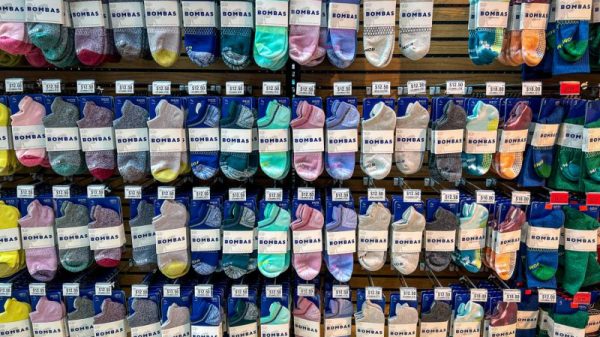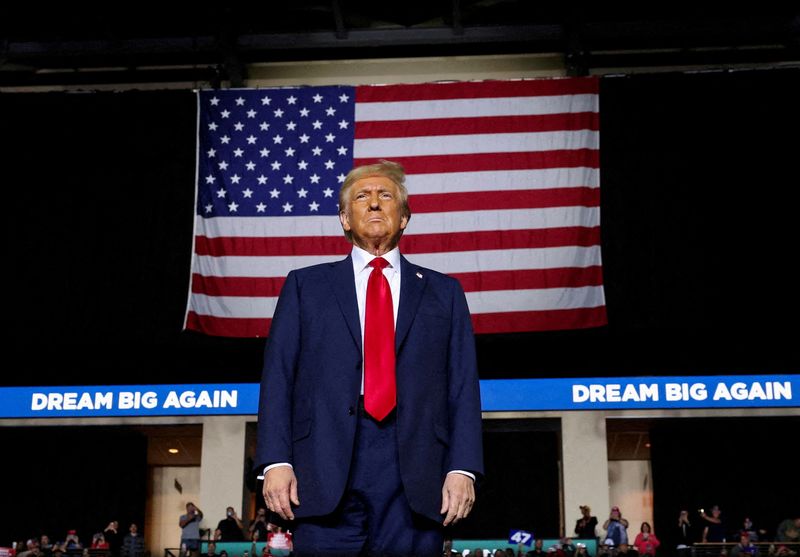By Lewis (JO:LEWJ) Krauskopf
NEW YORK (Reuters) – The U.S. stock market welcomed Donald Trump’s victory in the 2024 presidential election, but turbulence may lie ahead if the president-elect makes good on his tariff threats.
Much about the incoming administration’s policies remains uncertain, including whether Trump’s renewed threats last month to impose tariffs on China, Canada, Mexico and other U.S. trading partners are opening salvos to negotiating other issues, such as border security.
The timing and extent of new tariffs are also unclear, and the severity of the tariffs’ impact on the U.S. could depend on whether targeted countries respond with measures of their own.
Economists’ worst-case forecasts, however, paint a worrisome picture.
One extreme long-term scenario run by Oxford Economics showed world trade shrinking as much as 10% and U.S. economic growth about 1% below current expectations. Tariffs will hit corporate earnings, particularly in the retail, industrials and materials sectors, while stoking inflation, other forecasts show.
“Tariffs are basically bad for the economy,” said David Kelly, chief global strategist at JP Morgan Asset Management. “You can actually have a stagflationary effect of both increasing inflation pressures and reducing economic growth at the same time.”
Trump’s renewed threats caused waves in foreign currency markets, but U.S. stocks largely shrugged them off as the market extended this year’s more than 26% rally, which has taken the S&P 500 to record highs.
Barclays (LON:BARC) strategists estimated that proposed tariffs on Canada, Mexico and China – and any retaliatory actions – could drag S&P 500 earnings down 2.8%.
The materials and consumer discretionary sectors could face double-digit earnings declines, due to their significant supply and production presence in Mexico and Canada, Barclays said.
Retaliatory tariffs by targeted countries would exacerbate any earnings fallout.
BofA Global Research expects a 1% hit to S&P 500 earnings if tariffs on China double to 40% while they rise to around 8% for the rest of the world, excluding Mexico and Canada. But with retaliatory tariffs, which hurt foreign sales, the earnings hit would rise to 5%, the bank’s strategists wrote.
Tariffs may also increase the core measure of the personal consumption expenditures price index, a widely used inflation gauge, to around 2.5% from 2.3% next year, according to Deutsche Bank (ETR:DBKGn) economists.
The Trump campaign did not immediately respond to a request for comment.
LOOKING TO TRUMP 1.0
Trump has called tariffs “the most beautiful word in the world” and argued that his plans would rebuild the U.S. manufacturing base, grow U.S. jobs and incomes and earn trillions of dollars in federal revenues over 10 years.
Some investors are reviewing Trump’s tariffs during his first term for insight into their potential effect this time around.
The materials and industrial sectors were the market’s worst performers during a U.S.-China trade war in 2018, both falling more than 5% over a nine-month period, according to RBC Capital Markets.
Defensive stocks, popular during uncertain times, posted the strongest returns, with utilities and real estate both rising more than 10%, the bank said.
RBC’s strategists earlier this month downgraded the materials sector to “market weight” from “overweight,” citing its poor performance in that 2018 period as one factor. The sector has fallen 3% since Trump’s Nov. 5 election victory, versus a 4% gain for the S&P 500 over that time.
The tech sector tended to underperform on days of announced U.S. tariffs or China retaliations in 2018 and 2019, with particular weakness in hardware and semiconductors, a Citi analysis showed.
“However, given they remain at the forefront of the AI (artificial intelligence) story and may benefit from a front-loading of orders if tariffs are announced, we are less concerned on the immediate risk,” Citi strategists said in a recent report.
Higher tariffs on China could put retailers, industrial companies and tech hardware firms in the crosshairs, said David Lefkowitz, head of U.S. equities at UBS Global Wealth Management. Popular U.S. brands such as Apple (NASDAQ:AAPL) , Starbucks (NASDAQ:SBUX) and Nike (NYSE:NKE) could face retaliatory measures, Lefkowitz said.
Automakers manufacturing in Canada and Mexico could feel the heat from any tariffs, Lefkowitz said. General Motors (NYSE:GM) and other auto shares sold off after Trump’s tariff pledges last month.
Bullish investors point to various parts of Trump’s economic platform, including tax cuts and deregulation, that could potentially offset tariffs. Trump’s choice of prominent investor Scott Bessent to be U.S. Treasury Secretary, essentially the highest-ranking U.S. economic official, was also well received by Wall Street.
Trump has also historically measured his success at least in part by the strength of the stock market, Lefkowitz said. That could make him wary of implementing tariffs to a degree that would badly hurt stocks, Lefkowitz said.
“They are trying to boost U.S. growth,” Lefkowitz said. “Tariffs would end up reducing it and Trump tends to focus on how the market is performing. For that reason, the market has been downplaying so far what we have heard on tariffs.”





























